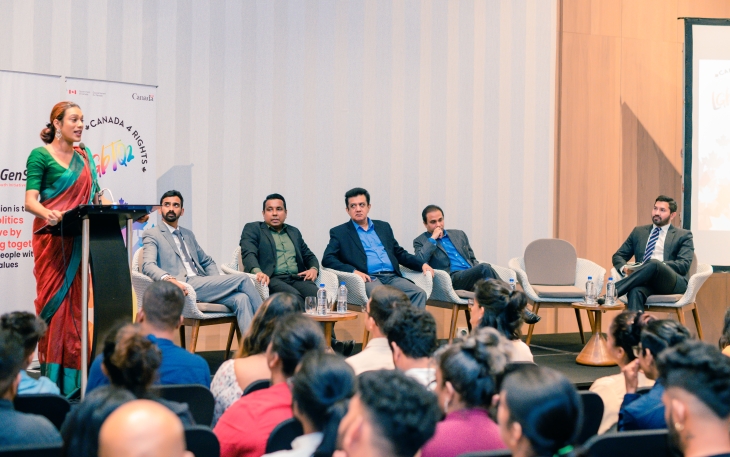Marking a historic day in Sri Lankan politics, representatives from several major political parties came together to discuss their views on non-discrimination of LGBTQ Sri Lankans.
Ceylon Workers Congress Leader, Minister Jeevan Thondaman, SLPP MP Premnath C. Dolawatte, SJB MP Mayantha Dissanayake and Freedom People’s Congress MP Prof. Charitha Herath shared their views during the discussion jointly hosted by NextGenSL and the Canadian High Commission to Sri Lanka. Attorney-at-Law Aritha Wickramasinghe, Equality Director of iProbono moderated the panel discussion.
Premnath Dolawatte, who recently presented a Private Member’s Bill to Parliament seeking to decriminalize LGBTQ Sri Lankans, said he was hopeful that the majority of MPs in the House would support his Bill and join the effort to protect the rights of the LGBTQ community.
“I know the ultimate fight should be for non-discrimination and decriminalization of the LGBTQ community is only one aspect of it. But, we must start somewhere,” Dolawatte said, sharing his views at the event.
Describing himself as an “untamed elephant”, the SLPP MP said he did not speak to the LGBTQ community before presenting his Private Member’s Motion to the House.
“Consider this an act of an untamed elephant. I haven’t spoken to the LGBTQ community nor have I spoken to any foreign mission in Sri Lanka. I only did my part, as a lawmaker, to ensure the rights of citizens of my country,” he added.
“Minister Ali Sabry has assured that the government will support the motion. Minister Prasanna Ranatunga has also communicated to me that the ruling party will back the Bill. So, I am hopeful that the motion will secure a majority in Parliament. However, it is now with the Attorney General’s Department and those who are aware of the system know that getting a document out of the AG’s Department is no easy task. Also, getting a private member’s Bill passed in Parliament is also a time-consuming process. But, with your support, I am confident that we will be able to get this done,” Dolawatte said.
MP Mayantha Dissanayake from the Samagi Jana Balawegaya said he was in favour of the Private Member’s Bill presented by Dolawatte.
“We are a progressive party and we understand the need for change. I briefly spoke to our party leader, Mr. Sajith Premadasa, and shared my views on this matter with him. We haven’t made a formal policy statement on this yet, but we are in favour of this because we want to do the right thing by the country.”
“When this is presented to Parliament, there will be stiff resistance from many quarters. That’s something we must expect. But I, as a Parliamentarian and e person who values human rights, will champion this cause within my party and within our parliamentary group. There are many countries in the world that have made progressive steps in this regard and we must follow those examples,” Dissanayake added.
“Addressing the concerns of religious circles will be a critically important step and I am confident that we will be able to convince them by directly engaging with the right information. For instance, this is perfectly in line with the fundamental teachings of Buddhism such as compassion and that should be the basis our engagement with Buddhist monks,” the MP said.
“We inherited a country that needed change. We must now deliver, “ Dissanayake said, adding that his traditional upbringing in Kandy would not deter him from supporting this cause.
Joining the discussion, Freedom People’s Congress MP Prof. Charitha Herath said they would support decriminalization of same-sex relations, if and when the Bill is presented to Parliament.
“We must engage with two domains to achieve the desired results. One is the political domain and the other is the cultural domain. We can change old-fashioned political and cultural establishments through constant engagement,” Herath explained.
“The technical approach alone will not usher in meaningful change. That is why I highlight the importance of cultural discussions as well to overcome the existing barriers. Sometimes, I feel that these cultural platforms are forgotten by the younger generation.”
“If you look at this region, India has made significant progress in the recent past while we are lagging behind. We must explore the reasons for this and address them adequately,” the MP added.
Minister Jeevan Thondaman, the youngest Cabinet Minister ever to hold office in Sri Lanka, countered the argument that culture was a barrier in achieving non-discrimination for the LGBTQ community in Sri Lanka.
“There are more than enough evidence from the ancient history was same-sex relations existed and they were very much embraced many, many centuries ago. There are ancient statues, literary works and many other things to prove this point. So, where did we go wrong?” Thondaman, the Leader of the Ceylon Workers Congress (CWC), asked.
“The answer is quite clear. It is the colonialization and westernization of our ancient civilizations. Their beliefs and values became a dominant factor and we lost many of ours.”
“Culture has never been a barrier to us. It is the colonial mindset that has become a barrier. It is time we understand the reality,” he added. “I am a member of a minority community and a representative of a marginalized group of people, I request you to take these little victories. It will eventually lead you to the promised land. 10 years ago, a dialogue of this nature would not have been possible. Today, we are trying to sit with you and understand the gravity of this issue,” Thondaman said pledging support to legislative reforms decriminalizing same-sex relations.
David Sood, Counsellor, Political and Trade from the Canadian High Commission to Sri Lanka delivered the opening remarks while Bhoomi Harendran and Kaushalya, a representative from Equal Ground shared observations from the civil society perspective.










